








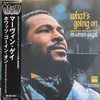
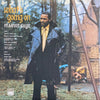
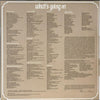
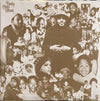

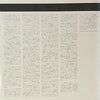
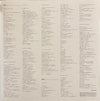
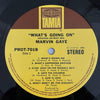
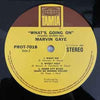
Marvin Gaye - What's Going On - Original Detroit Mix (Edition Japonaise)
Piano, vocals – Marvin Gaye [click here to see more vinyl featuring Marvin Gaye]
Backing Vocals – Elgie Stover, Lem Barney, Mel Farr, Bobby Rodgers, The Andantes (Jackie Hicks, Marlene Barrow, and Louvain Demps)
Alto Saxophone – Angelo Carlisi
Tenor Saxophone – George “Sax” Benson
Baritone Saxophone – Tate Houston
Bass – Bob Babbit, James Jamerson
Bongos, Congas – Earl DeRouen, Eddie Brown
Celesta – Johnny Griffith
Cello – Edward Korkigian, Italo Babini, Thaddeus Markiewicz
String Bass – Max Janowsky
Drums – Chet Forest
Flute – Dayna Hartwick, William Perich
Guitar – Joe Messina, Robert White
Harp – Carole Crosby
Alto Saxophone – Eli Fountain
Tenor Saxophone – William "Wild Bill" Moore
Soprano Saxophone – Larry Nozero
Tambourine, Percussion – Jack Ashford
Trombone – Carl Raetz
Trumpet – John Trudell, Maurice Davis
Vibraphone, Percussion – Jack Brokensha
Viola – David Ireland, Edouard Kesner, Meyer Shapiro, Nathan Gordon
Violin – Alvin Score, Beatriz Budinszky*, Felix Resnick, Gordon Staples, James Waring, Lillian Downs, Richard Margitza, Virginia Halfmann, Zinovi Bistritzky
Detroit Symphony Orchestra
Orchestra conductor and arrangements by David Van DePitte
Written by Marvin Gaye (all tracks), Al Cleveland (A1, A4, B2), Renaldo Benson (A1, A4, B2), James Nyx (A2, A5, B3), Anna Gordy Gaye (A5), Elgie Stover (A5), Earl Derouen (B1)
1LP, gatefold jacket, insert in English and Japanese
Original analog Master tape : YES
Heavy Press : 180g
Record color : Black
Speed : 33RPM
Size : 12'’
Stereo
Studio
Record Press : GZ Media
Label : Universal
Original label : Tamla
Recorded June–September 1970 and March–May 1971 at Hitsville U.S.A (Detroit), Golden World (Detroit), United Sound Studios (Detroit), The Sound Factory (West Hollywood)
Mixed by Steve Smith at Motown mix room, Detroit
Mastered by Kevin Reeves at Universal Mastering Studios-East
Produced by Marvin Gaye
Liner Notes by Marvin Gaye
Originally released in 2001 (as a CD)
Reissued in August 2021
Tracks :
Side A:
- What's Going On
- What's Happening Brother
- Flyin' High (In The Friendly Sky)
- Save The Children
- God Is Love
- Mercy Mercy Me (The Ecology)
Side B:
- Right On
- Wholy Holy
- Inner City Blues (Make Me Wanna Holler)
Awards:
Rolling Stone 500 Greatest Albums of All Time - Rated 1/500
Reviews :
“(…) the original version of the album minus vocal layering, keyboard overdubs, and other production techniques added in L.A. just two weeks before the album’s release. The differences are significant— the Detroit Mix production is sparse, the strings are less prominent, and there’s less sweetening overall. On Side 1, James Jamerson and Bob Babbitt’s soulful bass lines can be heard as connecting passages that were muted or absent on the final mix. In the junkie lament “Flying High (in the Friendly Sky),” Gaye’s background vocals are brought to the fore, emphasizing the call-and-response aspect of the songs. “Mercy Mercy Me (the Ecology)” sounds more contemplative and the song’s melodramatic coda is considerably subdued. As a result, these songs float wistfully on Gaye’s socially conscious lamentations and bring the work closer to the singer/songwriter convention.
On Side 2, the changes are evident from the get-go: the opening track, “Right On,” feels jazzier and more swinging. The piano, bass, and flute are more prominent, and the gimmicky ratcheted percussion, which dominates the final version, is placed lower in the mix, as are the strings. The track has a warm, inviting, intimate feel.
On “Inner City Blues (Make Me Wanna Holler),” the closing track, the pumping bass line that drove the final mix is hushed. Fittingly, the song trails off with an extended take on the solitary conga beat, rather than the startlingly dramatic hosanna ending of the final version, allowing the song, not the production, to make the final statement.” The Absolute Sound
“What's Going On is not only Marvin Gaye's masterpiece, it's the most important and passionate record to come out of soul music, delivered by one of its finest voices, a man finally free to speak his mind and so move from R&B sex symbol to true recording artist. With What's Going On, Gaye meditated on what had happened to the American dream of the past -- as it related to urban decay, environmental woes, military turbulence, police brutality, unemployment, and poverty. These feelings had been bubbling up between 1967 and 1970, during which he felt increasingly caged by Motown's behind-the-times hit machine and restrained from expressing himself seriously through his music. Finally, late in 1970, Gaye decided to record a song that the Four Tops' Obie Benson had brought him, "What's Going On." When Berry Gordy decided not to issue the single, deeming it uncommercial, Gaye refused to record any more material until he relented. Confirmed by its tremendous commercial success in January 1971, he recorded the rest of the album over ten days in March, and Motown released it in late May. Besides cementing Marvin Gaye as one of the most important artists in pop music, What's Going On was far and away the best full-length to issue from the singles-dominated Motown factory, and arguably the best soul album of all time.
Conceived as a statement from the viewpoint of a Vietnam veteran (Gaye's brother Frankie had returned from a three-year hitch in 1967), What's Going On isn't just the question of a baffled soldier returning home to a strange place, but a promise that listeners would be informed by what they heard (that missing question mark in the title certainly wasn't a typo). Instead of releasing listeners from their troubles, as so many of his singles had in the past, Gaye used the album to reflect on the climate of the early '70s, rife with civil unrest, drug abuse, abandoned children, and the spectre of riots in the near past. Alternately depressed and hopeful, angry and jubilant, Gaye saved the most sublime, deeply inspired performances of his career for "Mercy Mercy Me (The Ecology)," "Inner City Blues (Make Me Wanna Holler)," and "Save the Children." The songs and performances, however, furnished only half of a revolution; little could've been accomplished with the Motown sound of previous Marvin Gaye hits like "Stubborn Kind of Fellow" and "Hitch Hike" or even "I Heard It Through the Grapevine." What's Going On, as he conceived and produced it, was like no other record heard before it: languid, dark, and jazzy, a series of relaxed grooves with a heavy bottom, filled by thick basslines along with bongos, conga, and other percussion. Fortunately, this aesthetic fit in perfectly with the style of longtime Motown session men like bassist James Jamerson and guitarist Joe Messina. When the Funk Brothers were, for once, allowed the opportunity to work in relaxed, open proceedings, they produced the best work of their careers (and indeed, they recognized its importance before any of the Motown executives). Bob Babbitt's playing on "Inner City Blues (Make Me Wanna Holler)" functions as the low-end foundation but also its melodic hook, while an improvisatory jam by Eli Fountain on alto sax furnished the album's opening flourish. (Much credit goes to Gaye himself for seizing on these often tossed-off lines as precious; indeed, he spent more time down in the Snakepit than he did in the control room.) Just as he'd hoped it would be, What's Going On was Marvin Gaye's masterwork, the most perfect expression of an artist's hope, anger, and concern ever recorded.” AllMusic Review by John Bush
Ratings:
AllMusic : 5 / 5 ; Discogs : 4.8 / 5

